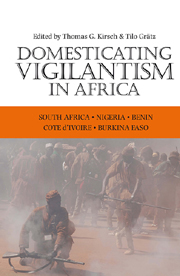Book contents
2 - Ethnicity, Religion & the Failure of ‘Common Law‘ in Nigeria
Published online by Cambridge University Press: 05 April 2013
Summary
Introduction
With Nigeria's return to democracy in 1999 after 15 years of military rule, violence between different ethnic and religious groups ‘exploded’ (Ukiwo 2003: 115; Agbu 2004: 5, 13). Tensions had already built up under the military regime, but the security forces had been able to suppress most conflicts. When the generals returned to barracks and a more liberal and restrained government took over, the number of vigilante groups and militias in operation rose dramatically (Agbu 2004: 5; Pratten 2008: 1; Guichaoua 2007: 92). Many of these organisations claimed to be fighting for ‘true democracy’, by which they meant, above all, the right of ethnic or religious communities to control ‘their’ territory and resources, to live according to their own ideas of law and justice, and to be free from the ‘internal colonialism’ of other ethnic groups. In a deeply divided society like Nigeria's the call for democratic self-determination accordingly did not unite the people, but set ethnic and religious groups against each other, with devastating results: as Kukah (2002: 23) notes, ‘fewer people died in the entire period of military rule than … have now died in the first two year[s] of our democracy’. In mid-2005 it was estimated ‘that at least 50,000 people have been killed in various incidents of ethnic, religious and communal violence since the return to civilian rule’ (Economist Intelligence Unit 2005: 13).
- Type
- Chapter
- Information
- Domesticating Vigilantism in Africa , pp. 51 - 78Publisher: Boydell & BrewerPrint publication year: 2010



